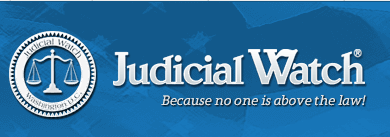Clinton operations receive tens of millions of dollars of contributions from Uranium One/Russia Interests
(Washington, DC) – Judicial Watch announced today that it filed a Freedom of Information Act (FOIA) lawsuit against the U.S. Department of Justice and the U.S. Department of State for all records of communications relating to Uranium One (Judicial Watch v. U.S. Department of Justice (No. 1:18-cv-00722)). The suit was filed in the U.S. District Court for the District of Columbia on March 29.
Judicial Watch sued the agencies after they failed to respond to two December 22, 2017, FOIA requests. Judicial Watch asked the Justice Department for:
- All records regarding, the company Uranium One (otherwise known as Uranium One, Inc. or SXR Uranium One, Inc.), including records of communication sent to and from officials in the offices of the Attorney General and Deputy Attorney General, Office of Legal Counsel, and the National Security Division from January 20, 2009 through December 31, 2013.
The State Department was asked to produce:
- Any records relating to the company Uranium One (otherwise known as Uranium One, Inc. or SXR Uranium One, Inc.), including records of communication sent to and from officials in the Office of the Secretary of State, Office of the Legal Advisor, Office of the Under Secretary for Arms Control and International Security Affairs, Office of Arms Control, Verification and Compliance, Office of International Security and Nonproliferation, and the Office of Political-Military Affairs from January 20, 2009 through December 31, 2013.
This lawsuit is part of Judicial Watch’s continuing investigation of the highly controversial 2010 Uranium One deal. At the time, a Russia state-owned nuclear firm, Rosatom, sought to buy Uranium One, a Canadian mining company. Because Uranium One held licenses for 20 percent of America’s uranium production capacity, the sale had to be approved by the nine members of the Committee on Foreign Investment in the United States (CFIUS), including Secretary of State Hillary Clinton, who assented to the transaction. Uranium One interests contributed more than $140 million to the Clinton Foundation.
In January 2008, Judicial Watch revealed that Bill Clinton had helped Vancouver mining mogul Frank Giustra secure tens of millions of dollars’ worth of uranium. Guistra built a company that became part of Uranium One. The Clinton Foundation later received a $31.3 million donation, as well as a future pledge of $100 million. In July 2014, Judicial Watch released more than 200 Clinton conflict-of interest documents, including a record of a speech in Moscow in June 2010 sponsored by the investment bank Renaissance Capital by Bill Clinton addressing the theme of “Russia and the Commonwealth of Independent States: Going Global.” The document notes that “Renaissance Capital is an investment bank focused on the emerging markets of Russia, Ukraine, Kazakhstan, and sub-Saharan Africa.” Renaissance Capital has also been linked to Russia efforts to gain control of Uranium One.
“It is simply remarkable that Judicial Watch had to sue the State and Justice Departments in federal court for basic information about the shady Uranium One deal,” said Judicial Watch President Tom Fitton. “It seems Judicial Watch has done more to investigate the Clinton-Russia connections than the Justice Department, even as DOJ resources are spent on supporting Mueller’s massive investigation into the fanciful Clinton Dossier-inspired Trump-Russia conspiracy theory. We hope the Uranium One cover-up ends thanks to these lawsuits.”
According to a 2013 New York Times report, the Clinton Foundation hid many of the beneficiaries of the Uranium One deal approved by CFIUS and Mrs. Clinton:
As the Russians gradually assumed control of Uranium One in three separate transactions from 2009 to 2013, Canadian records show, a flow of cash made its way to the Clinton Foundation.
Uranium One’s chairman used his family foundation to make four donations totaling $2.35 million. Those contributions were not publicly disclosed by the Clintons, despite an agreement Mrs. Clinton struck with the Obama White House to publicly identify all donors. Other people with ties to the company made donations as well.
And shortly after the Russians announced their intention to acquire a majority stake in Uranium One, Mr. Clinton received $500,000 for a Moscow speech from a Russian investment bank [Renaissance Capital] with links to the Kremlin that was promoting Uranium One stock.
At the time, both Rosatom and the United States government made promises intended to ease concerns about ceding control of the company’s assets to the Russians. Those promises have been repeatedly broken, records show.
Prior to the Uranium One deal, the FBI reportedly “had gathered substantial evidence that Russian nuclear industry officials were engaged in bribery, kickbacks, extortion and money laundering designed to grow Vladimir Putin’s atomic energy business inside the United States, according to government documents and interviews.”
Rather than bring immediate charges in 2010, however, the Department of Justice (DOJ) continued investigating the matter for nearly four more years, essentially leaving the American public and Congress in the dark about Russian nuclear corruption on U.S. soil during a period when the Obama administration made two major decisions benefiting Putin’s commercial nuclear ambitions.
***
Then-Attorney General Eric Holder was among the Obama administration officials joining Hillary Clinton on the Committee on Foreign Investment in the United States at the time the Uranium One deal was approved. Multiple current and former government officials told The Hill they did not know whether the FBI or DOJ ever alerted committee members to the criminal activity they uncovered.
The investigation was ultimately supervised by then-U.S. Attorney Rob Rosenstein, an Obama appointee who now serves as President Trump’s deputy attorney general, and then-Assistant FBI Director Andrew McCabe …”

